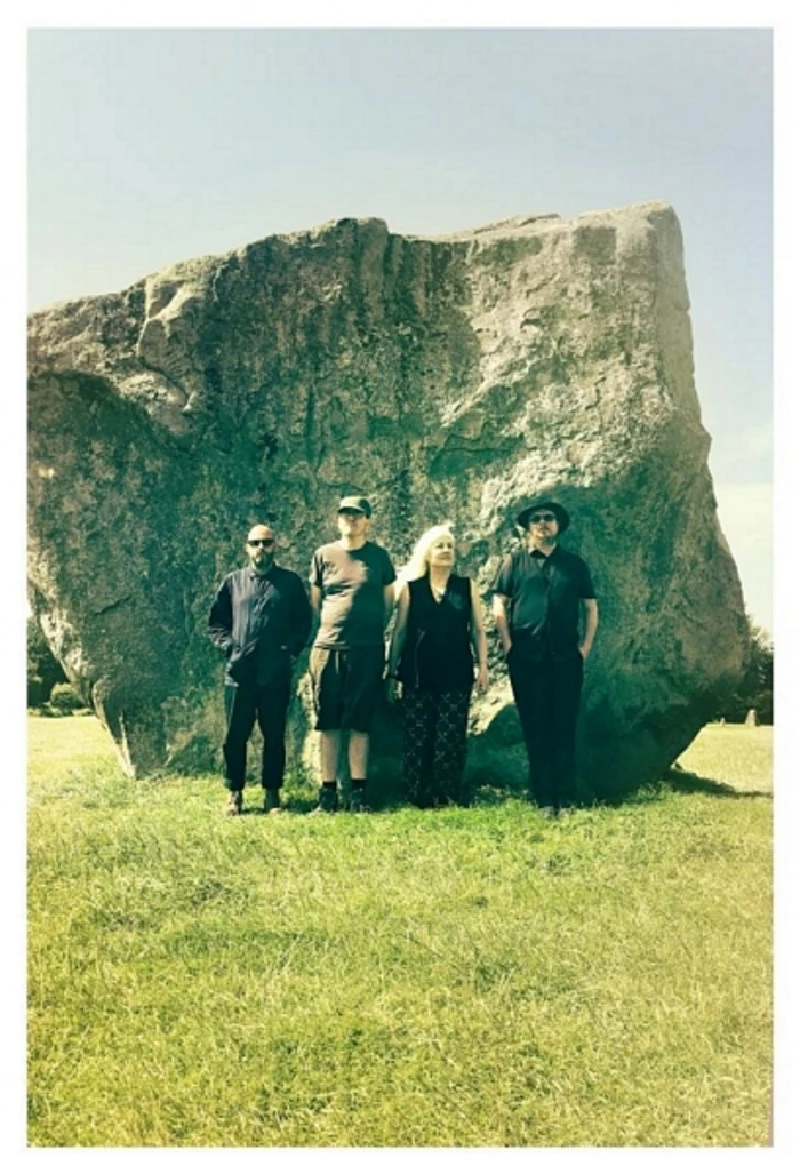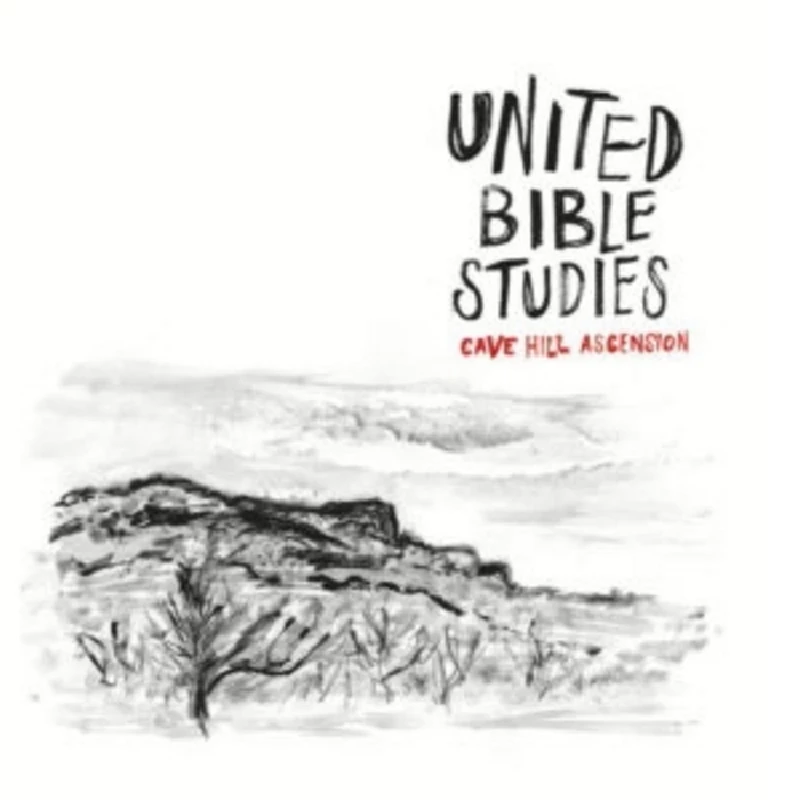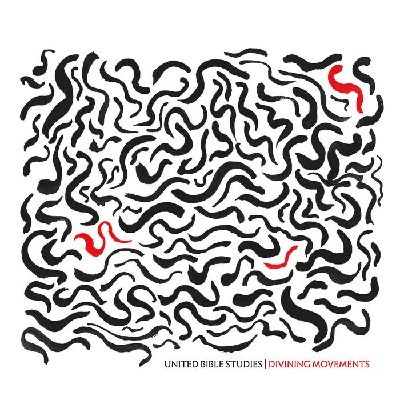United Bible Studies - Interview
by Malcolm Carter
published: 7 / 11 / 2019

intro
Malcolm Carter speaks to David Colohan, Dom Cooper and Alison O’Donnell from psychedelic folk act United Bible Studies about its evolving membership and latest album, 'Cave Hill Ascension'.
Jeanette Leech, in her book ‘Seasons They Change’ (subtitled 'The Story of Acid and Psychedelic Folk', which gives an accurate indication of what the book covers), tells the history of the loose collective known as United Bible Studies more articulately than I ever could and is highly recommended to anyone with an interest in any of the different forms of folk music. There is a brilliant quote when Leech writes about United Bible Studies from an early member of the collective named Gavin Prior which sums up why so many talented artists have passed through United Bible Studies and why their music still hasn’t reached the number of ears it deserves too. Prior’s view on why the collective attracted so many musicians was because he felt that everyone who liked the band actually joined the band. Maybe not entirely accurate but some indication as to how easy it was to be drawn into the collective’s music and feel part of it. Prior went on to say that with so many enjoying the music actually being part of the band there was no one left to buy the records. It’s changed a little from those early days. While I’m certain that the band would still love to sell more records, their latest releases are much easier to track down than the early CD-Rs and the collective’s music is finally reaching a wider audience. But one thing hasn’t changed and that’s the band’s ability to take the listener on a journey with their music to visit unchartered territories and their latest album, ‘Cave Hill Ascension’, released on the Pariah Child label, does just that and is a career high. United Bible Studies, for this latest album, is down to just three artists; David Colohan who started the band back in 2001, Dom Cooper and Alison O’Donnell. ‘Cave Hill Ascension’ features only four pieces of music, two short songs and two lengthier pieces. The skill of each musician is obvious, the playing is outstanding and although it has become something of a cliché the album really does take the listener on a journey, especially on the two longer pieces. But what really strikes the listener before repeated playing reveals all the little nuances that seep through with each subsequent play are the stunning wordless vocals that form the backbone of the pieces. Alison O’Donnell has produced some breathtaking music throughout her long musical career and it’s never failed to move us but her vocal contributions to ‘Cave Hill Ascension’ surely rank as some of her best performances to date. The atmosphere created not only by the instruments but by these wordless vocals is beautifully otherworldly. With such a vast back catalogue and with so many talents passing through the collective we felt it was about time we gave some space to such a ground-breaking and experimental group of artists so we took the opportunity to ask those involved with ‘Cave Hill Ascension’ a few questions. We thank them for their time in answering the questions and would like to point you in the direction of the United Bible Studies Bandcamp page at https://united-bible-studies.bandcamp.com where you can sample just how innovative the collective which produces music under the United Bible Studies name is. PB: When was United Bible Studies formed and what was the inspiration behind it? DAVID COLOHAN: In 2001 I moved back to Ireland from Australia. In Dublin's Forbidden Planet, queuing for Tom Baker's autograph, I met a friend from Longford. He was living in Trinity College and introduced me to James Rider who was also studying there. We became friends, bonding over records, and decided to form a duo inspired by a mutual love of the Incredible String Band. One of his housemates had a book called 'United Bible Studies' on the shelf and we thought that would be a good name, as we both came from different backgrounds North and South of the border. We were being gently irreverent but the name stuck. Around this time, AMM played in Dublin and Eddie Prévost ran an improvisation workshop. At this, I met Gavin Prior and Shane Cullinane and we soon set up the Deserted Village label, which Gavin still runs. Along with Scott McLaughlin, we also formed a free improvisation group called Murmansk. A collective was born and the CD-R underground was thriving. We booked touring bands we admired and recorded whenever we could, forming multiple side-projects. A very creative period. PB: It’s been stated that over 200 musicians have contributed to United Bible Studies through the years, is that so and were any who contributed to ‘Cave Hill Ascension’ part of the early line-up? DAVID: I'm guessing another fifty or so have passed through the ranks since then, most of them involved in one-off live performances. As we are very open to collaboration, we happily play with new people when we're touring. On the recording end, we also collaborate with people we have yet to meet. As for 'Cave Hill Ascension', James Rider provided the sleeve notes and I wrote the songs, so the earliest line-up is present. PB: Has there ever been a dream line up that you hoped would stay so you could continue as a band with the same permanent members? ALISON O'DONNELL: The collective/band has evolved naturally. People have joined for a period either live or on record and dropped out or remained as time passed and lives changed in the usual ways. The current line-up is the most cohesive and productive in many a year. DAVID: The current live incarnation, including those who contribute to albums from afar, makes for a perfect line-up. When we tour, we tend to mix it up with days where we can go exploring. Last year saw some wanderings in M.R. James country and during the summer we visited Avebury and Coombe Gibbet, taking in a trip to Farley Chamberlayne (or at least to its front gate) to see where Fairport Convention recorded 'Liege & Lief'. My favourite memory of that trip is from a pub in Sutton Scotney, where Graeme Lockett (Head South By Weaving) lives. I don't think I've ever laughed so much. Coming together is as much about these little adventures as it is about making music. The original idea behind inviting people to join, especially if they showed any interest in our activities, was so that we could make new friends and travel. PB: How do you recruit members? Do like-minded artists gravitate naturally towards the collective or do you approach certain musicians you feel could add something to your vision? DOM COOPER: I see United Bible Studies as a congregation of friends, brought together through playing live music. With a raft of mutual interests as well as diverging ones, a sense of humour and a joy of creation. ALISON: Yes, to both parts of that question. It is an organic process that seems to work very well. Occasionally it becomes obvious that someone is not a good fit but they tend to drift away of their own accord, and sometimes we approach artists with ideas for a collaboration but they might feel it doesn’t suit them. Those occurrences are, however, far outweighed by the wonderful merging of minds on numerous projects over the past eighteen years. PB: Alison, you're an artist who is always pushing boundaries and who is currently making some of the most adventurous and beautiful music of her career. How did you become part of the collective? ALISON: I have been a Student since 2008. For at least the first five of those years, my input and connection was thought to be occasional, but that is not the case. My contribution grew exponentially over time. Although I have collaborated with a number of artists for many years, including groups I still work with, i.e. Head South By Weaving and Firefay, my main focus aside from solo work and one-off projects, is United Bible Studies. I have been writing, recording and performing with them steadily for eleven years. Gavin Prior, a former, long-term Student, asked me if I would like to participate in a gig with a dozen plus singers and one drummer in 2008 while both of us were at an Espers concert in Dublin. PB: Many of the early United Bible Studies releases were only available as limited edition CDs. Are there any plans to make these available again for new converts? DAVID: Most of the early releases are available on our Bandcamp, for anyone who missed them first time around. As for reissues, 'Spoicke' came out on CD first and was later released on vinyl. We are always open to further editions of older material. PB: Which album would you suggest a newcomer to your music should start with to get a general idea of what United Bible Studies are about musically? DAVID: 'The Shore That Fears The Sea', the first album proper, is probably as good a place to start as any, with a balance between songs and weirder explorations. Those who prefer seventies-inspired folk will probably find 'The Ale's What Cures Ye' to their liking. The more experimental side of the band is all over the 'Observatory' series. PB: With such a large back catalogue do you have a personal favourite United Bible Studies album and, if so, which one? DOM: I’d choose this new one, 'Cave Hill Ascension','The Ale’s What Cures Ye' and 'Rosary Bleeds' as my favourites. They are all very different, yet tied together by the voice. The power of the singing voice is what binds them. PB: As independent artists following your own unique vision what has been the biggest hurdle in getting your music out there and what advice would you offer to aspiring musicians just starting out? ALISON: United Bible Studies would like to perform at more concerts and festivals. Attracting the attention of industry practitioners and professionals is extremely difficult in the current economic climate. Aspiring musicians will doubtless have to face the same obstacles if they are creating music which is essentially non-mainstream. On the other hand, not having the control of label, agent or manager can often lead freer and more interesting creation and the empowerment of independence. DAVID: We haven't exactly followed any set plan. We've been lucky in that many labels from different countries have released our albums over the years. Festival offers usually lead to us organising tours around them and these tend to mainly be in the UK. As we're scattered across different countries it isn't always practical to meet up, so tours become important. We get to catch up and meet like-minded folks. PB: United Bible Studies albums have always had striking images on the sleeves and ‘Cave Hill Ascension’ is no exception, one of the best so far. Are the images on the sleeves always inspired by the music within? DOM COOPER: A lot of the music, ideas and imagery are inspired by landscape, an awe of nature. It can be a chance encounter with feathers planted in a trunk of a tree, that moment of bruised purple skies before a storm, or cresting a hill with the sun coming up. Cave Hill overlooks Belfast. It seemed obvious to represent that on the album. The actual approach was one of craft and hand with a moment of chance. The image was done in ink, but the sky was created by oversoaking and peeling the paper away by accident. The rest of the design was meant to be sympathetic with that. PB: It’s fair to say that listening to a United Bible Studies album is taking a musical journey into the unknown. But it is a journey; although the four songs on ‘Cave Hill Ascension’ are separate pieces it’s a complete and satisfying journey. Was it written to take the listener on a journey with a definite beginning and end? ALISON: It is a progression of divining movements. DAVID: Indeed, 'Cave Hill Ascension' is the first album in a trilogy, with the others to follow in the future. The second, 'Divining Movements', is a double and firmly within the more meditative vein of the longer Cave Hill pieces. The third, 'West Kennet Ascension', contains unaccompanied songs recorded at sacred sites as well as longer forays into ecstatic folk drone. Divining movements are a way of accessing the numinous. Can we trigger these experiences when we play or sing? In the first album, the longer pieces attempt to evoke a sense of quiet awe. The shorter songs, repeating phrases as a sort of mantra, attempt to either escape or be enveloped by their meaning. The second album is a meditation on landscapes and starscapes. The third album contains songs we have performed live, such as 'On Silbury Hill' and embraces the idea of recording in places like Wayland's Smithy and West Kennet Long Barrow. So it is more of a cyclical journey than one with a definite beginning and end. PB: The use of wordless vocals, especially on the two longer pieces on the album, is very effective; sometimes sounds can express more emotion than actual words. Who was responsible for the arrangements of those vocal sounds? DOM: The voice is universal, using vocals untethered from lyrics causes an instant emotional connection. The sounds are euphoric, yearning and revelatory. They become vows, open to interpretation. PB: Please correct me if I’m wrong but I think ‘Cave Hill Ascension’ features the smallest of the United Bible Studies recording collective to date with just four musicians contributing; would you hope that this unit will make further recordings together? ALISON: 'Cave Hill Ascension' was created by a trio of voices and is an example of how each of the band’s releases follows an entirely different path. The current live and recording line-up of four core members has proved to be an extremely affable and productive experience. There is a lot of completed work already in the vault. PB: What’s next for the collective? Any touring plans and, if so, who can we expect to see on stage? ALISON: Hopefully the current grouping, but there is often room for surprise additions on an ad hoc basis. We tend to undertake mini-tours but would very much like to take part in festivals and gatherings. As we are based in the U.K. and Ireland, the logistics can be challenging, but more frequent live work would be very welcome. PB: Thank you.
Band Links:-
https://united-bible-studies.bandcamp.com/https://www.facebook.com/unitedbiblestudies/
Have a Listen:-
Picture Gallery:-

reviews |
|
West Kennet Ascension/Divining Movements (2021) |

|
| Impressive two releases from collective United Bible Studies, one a cassette/download only issue, the other a double CD, which prove to essential listening for these worrying times. |
| Cave Hill Ascension (2019) |
| The Jonah (2009) |
most viewed articles
current edition
Carl Ewens - David Bowie 1964 to 1982 On Track: Every Album, Every SongArmory Show - Interview with Richard Jobson
Colin Blunstone - Thalia Hall, Chicago, 16/7/2025
Visor Fest - Valencia, Spain, 26/9/2025...27/9/2025
John McKay - Interview
Bathers - Photoscapes 1
Loft - Interview
Billie Eilish - O2 Arena, London, 10/7/2025
Robert Forster - Interview
Sir Tim Rice - Interview
previous editions
Heavenly - P.U.N.K. Girl EPManic Street Preachers - (Gig of a Lifetime) Millennium Stadium, Cardiff, December 1999
Beautiful South - Ten Songs That Made Me Love...
Oasis - Oasis, Earl's Court, London, 1995
Pixies - Ten Songs That Made Me Love...
Prolapse - Interview
Boomtown Rats - Ten Songs That Made Me Love....
Trudie Myerscough-Harris - Interview
Coldplay - Wembley Arena. London, 16/8/2022
Peter Perrett - In Dreams Begin Responsibilities Interview Part One
most viewed reviews
current edition
Amy Macdonald - Is This What You've Been Waiting For?Sick Man of Europe - The Sick Man of Europe
Phew, Erika Kobayashi,, Dieter Moebius - Radium Girls
Lucy Spraggan - Other Sides of the Moon
Davey Woodward - Mumbo in the Jumbo
Alice Cooper - The Revenge of Alice Cooper
Bush - I Beat Loneliness
Suzanne Vega - Flying With Angels
Blueboy - 2
Cynthia Erivo - I Forgive You
Pennyblackmusic Regular Contributors
Adrian Janes
Amanda J. Window
Andrew Twambley
Anthony Dhanendran
Benjamin Howarth
Cila Warncke
Daniel Cressey
Darren Aston
Dastardly
Dave Goodwin
Denzil Watson
Dominic B. Simpson
Eoghan Lyng
Fiona Hutchings
Harry Sherriff
Helen Tipping
Jamie Rowland
John Clarkson
Julie Cruickshank
Kimberly Bright
Lisa Torem
Maarten Schiethart